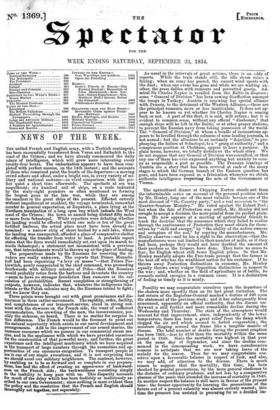The agricultural dinner at Chipping Norton stands nut from the
interminable series on account of the personal position taken by Mr. Henley, long one of the most valuable because one of the most discreet of "the Country party," and a real accession to "the Quarter-Sessions Ministry." He voted against Sir Robert Peel ; but when the fate of Protection was settled, Mr. Henley did not scruple to accept a decision the more painful from its perfect plain- ness. Ile now appears at a meeting of agricultural friends to teach the doctrine that the assurance which they failed to realize through the continuance of Protection they must obtain for them.. selves by "skill and energy," by "the ability of the native owners and occupiers of the soil," by copying the manufacturers. Mr. Henley observes—and he has a right to the observation—that the manufacturers were not limited in their number of mills, or if they had been, perhaps they would not have doubled the amount of their produce as the farmers have done. They have no cause to fear ; for English wheat still bears English prices. So that Mr. Henley manfully adopts the Free-trade precept that the farmer is the best off who has the wealthiest nation for his customer. If he throws away Protection distinctions in economy, Mr. Henley equally throws away vulgar Opposition distinctions in respect to the war ; and, whether on the field of agriculture or of battle, he counsels united energies in a common cause. It is a declaration of feeling as timely as it is manly.


























